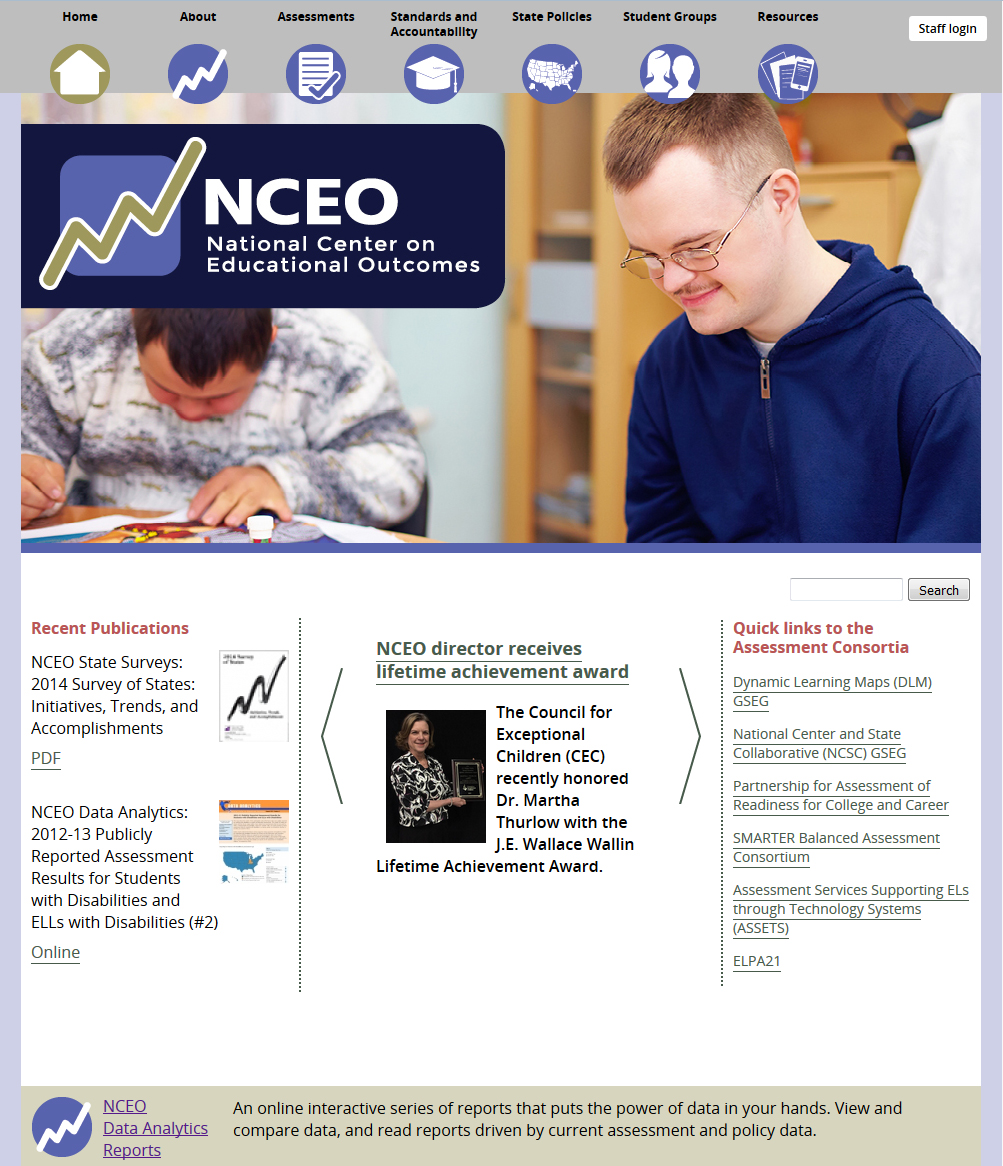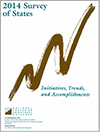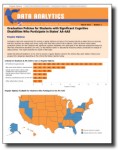Welcome!
The year 2017 already has brought with it a lot of activity. In this issue, new NCEO activities and products are highlighted. NCEO is excited to be collaborating with the University of Texas in the new National Deaf Center on Postsecondary Outcomes (see New Deaf Center Grant). Other NCEO collaborations are reflected in its work with ACHIEVE on diplomas for students with disabilities, and in its work on the state defined alternate diploma with the National Technical Assistance Center on Transition (NTACT). A new report by NCEO provides baseline information on how states are addressing the exit of English learners (ELs) with disabilities from EL services (see How States Make Exit Decisions…). Finally, in this issue we provide some updates on NCEO’s DIAMOND project activities.
– Martha Thurlow, NCEO Director
New Deaf Center Grant
NCEO is pleased to partner with the Meadows Center for Preventing Educational Risk (MCPER) to establish a national center on postsecondary outcomes for deaf individuals. A primary goal of the National Deaf Center on Postsecondary Outcomes is to increase the numbers of deaf individuals who are admitted to, without requiring remedial coursework, persist in, and complete postsecondary education or training.
NCEO Collaborates with ACHIEVE on Report on Diplomas for Students with Disabilities
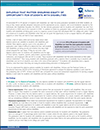 To try to understand the diploma options available for students with disabilities, Achieve and NCEO partnered to analyze the diplomas available in each state for the graduating class of 2015. The report, Diplomas that Matter: Ensuring Equity of Opportunity for Students with Disabilities, also compares the course and assessment requirements for earning a regular diploma in each state for students with disabilities and their peers without disabilities.
To try to understand the diploma options available for students with disabilities, Achieve and NCEO partnered to analyze the diplomas available in each state for the graduating class of 2015. The report, Diplomas that Matter: Ensuring Equity of Opportunity for Students with Disabilities, also compares the course and assessment requirements for earning a regular diploma in each state for students with disabilities and their peers without disabilities.
State-Defined Alternate Diplomas for Students with Significant Cognitive Disabilities
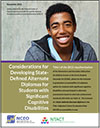 NCEO and the National Technical Assistance Center on Transition (NTACT) recently jointly published a Brief, Considerations for Developing State-Defined Alternate Diplomas for Students with Significant Cognitive Disabilities. It describes the criteria that must be met for a State-defined alternate diploma to meet federal requirements for inclusion in the Title I Adjusted Cohort Graduation Rate (ACGR). It includes considerations for states contemplating the development of a State-defined alternate diploma, and recommends steps for those deciding to adopt a State-defined alternate diploma.
NCEO and the National Technical Assistance Center on Transition (NTACT) recently jointly published a Brief, Considerations for Developing State-Defined Alternate Diplomas for Students with Significant Cognitive Disabilities. It describes the criteria that must be met for a State-defined alternate diploma to meet federal requirements for inclusion in the Title I Adjusted Cohort Graduation Rate (ACGR). It includes considerations for states contemplating the development of a State-defined alternate diploma, and recommends steps for those deciding to adopt a State-defined alternate diploma.
How States Make Exit Decisions for English Learners with Disabilities
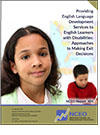 NCEO recently published a new report, Providing English Development Services to English Learners with Disabilities: Approaches to Making Exit Decisions. It describes what we know about current populations of ELs with disabilities, including their numbers and disability characteristics. It then presents the results of a survey that asked states about their exit criteria. The purpose of this report is to provide a baseline report on factors that affected decisions to exit ELs with disabilities prior to the passage of the Every Student Succeeds Act (ESSA).
NCEO recently published a new report, Providing English Development Services to English Learners with Disabilities: Approaches to Making Exit Decisions. It describes what we know about current populations of ELs with disabilities, including their numbers and disability characteristics. It then presents the results of a survey that asked states about their exit criteria. The purpose of this report is to provide a baseline report on factors that affected decisions to exit ELs with disabilities prior to the passage of the Every Student Succeeds Act (ESSA).
Update on NCEO’s DIAMOND Project Activities
![]() In 2015, the National Center on Educational Outcomes and nine state partners (Minnesota, Alabama, Connecticut, Maryland, Michigan, Ohio, West Virginia, Wisconsin and the Virgin Islands) began a two-year Enhanced Assessment Grant project called “Data Informed Accessibility—Making Optimal Needs-Based Decisions (DIAMOND).” The DIAMOND project will improve the validity of state English language arts, mathematics, and English language proficiency (ELP) assessment results by developing decision-making guidelines for choosing accessibility features and accommodations for K-12 students. We present updates that include a new project website and presentations at upcoming conferences.
In 2015, the National Center on Educational Outcomes and nine state partners (Minnesota, Alabama, Connecticut, Maryland, Michigan, Ohio, West Virginia, Wisconsin and the Virgin Islands) began a two-year Enhanced Assessment Grant project called “Data Informed Accessibility—Making Optimal Needs-Based Decisions (DIAMOND).” The DIAMOND project will improve the validity of state English language arts, mathematics, and English language proficiency (ELP) assessment results by developing decision-making guidelines for choosing accessibility features and accommodations for K-12 students. We present updates that include a new project website and presentations at upcoming conferences.
NCEO’s National Assessment Center is supported through a Cooperative Agreement (#H326G160001) with the Research to Practice Division, Office of Special Education Programs, U.S. Department of Education. The Center is affiliated with the Institute on Community Integration at the College of Education and Human Development, University of Minnesota. The contents of this report were developed under the Cooperative Agreement from the U.S. Department of Education, but do not necessarily represent the policy or opinions of the U.S. Department of Education or Office within it. Readers should not assume endorsement by the federal government.
Project Officer: David Egnor

 NCEO has been awarded a five-year grant by the U.S. Department of Education, Office of Special Education Programs, to continue its work as a national technical assistance center. Starting October 1, 2016, NCEO’s knowledge development and technical assistance activities focus on increasing the participation and improving the results of students with disabilities on state and districtwide assessments.
NCEO has been awarded a five-year grant by the U.S. Department of Education, Office of Special Education Programs, to continue its work as a national technical assistance center. Starting October 1, 2016, NCEO’s knowledge development and technical assistance activities focus on increasing the participation and improving the results of students with disabilities on state and districtwide assessments.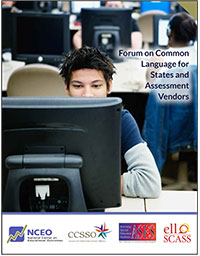
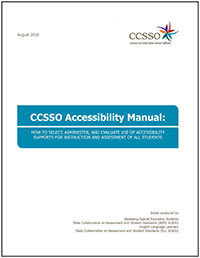 An accessibility manual was recently published by the Council of Chief State School Officers (CCSSO). It establishes guidelines for states to use for the selection, administration, and evaluation of accessibility supports for instruction and assessment of all students, including students with disabilities, English learners (ELs), ELs with disabilities, and students without an identified disability or EL status.
An accessibility manual was recently published by the Council of Chief State School Officers (CCSSO). It establishes guidelines for states to use for the selection, administration, and evaluation of accessibility supports for instruction and assessment of all students, including students with disabilities, English learners (ELs), ELs with disabilities, and students without an identified disability or EL status.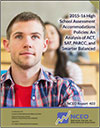 NCEO recently published a new report on high school accommodations policies, 2015-16 High School Assessment Accommodations Policies: An Analysis of ACT, SAT, PARCC and Smarter Balanced. Many students with disabilities and ELs use accommodations to access the ACT, SAT, PARCC, and Smarter Balanced assessments. This report analyzes differences in the accessibility framework, decision-making process, and terminology across the four assessments.
NCEO recently published a new report on high school accommodations policies, 2015-16 High School Assessment Accommodations Policies: An Analysis of ACT, SAT, PARCC and Smarter Balanced. Many students with disabilities and ELs use accommodations to access the ACT, SAT, PARCC, and Smarter Balanced assessments. This report analyzes differences in the accessibility framework, decision-making process, and terminology across the four assessments.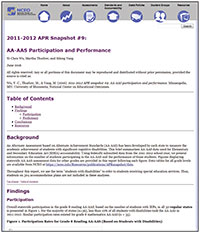 States annually report through an Annual Performance Report (APR) on their progress toward meeting the targets in their State Performance Plan (SPP). NCEO recently published several APR Snapshots that use 2013-14 APR data to look at how students with disabilities are included in assessments used for Elementary and Secondary Education Act (ESEA) accountability.
States annually report through an Annual Performance Report (APR) on their progress toward meeting the targets in their State Performance Plan (SPP). NCEO recently published several APR Snapshots that use 2013-14 APR data to look at how students with disabilities are included in assessments used for Elementary and Secondary Education Act (ESEA) accountability.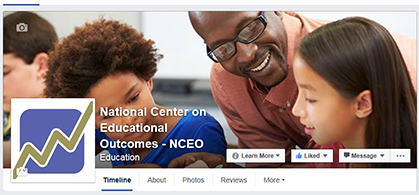 NCEO recently launched its Facebook page. NCEO hopes that being on Facebook will Increase visibility of NCEO and its work, share with wider audiences its products, inform audiences on upcoming activities, and keep TA partners engaged with NCEO.
NCEO recently launched its Facebook page. NCEO hopes that being on Facebook will Increase visibility of NCEO and its work, share with wider audiences its products, inform audiences on upcoming activities, and keep TA partners engaged with NCEO.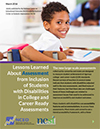 Recent surveys of teachers found that students with disabilities like many of the features of the new college- and career-ready (CCR) assessments that were recently rolled out by states and consortia. Still, teachers identified assessment challenges that need to be addressed to improve student outcomes.
Recent surveys of teachers found that students with disabilities like many of the features of the new college- and career-ready (CCR) assessments that were recently rolled out by states and consortia. Still, teachers identified assessment challenges that need to be addressed to improve student outcomes.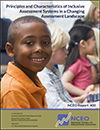 NCEO released an updated version of its Principles report, one that recognizes a dramatically changing assessment landscape. The report, titled Principles and Characteristics of Inclusive Assessment Systems in a Changing Landscape, is an update of the 2008 Principles. It reflects the broader perspective that acknowledges that the Principles apply to English learners (ELs) and ELs with disabilities, as well as to students with disabilities. The principles also apply to all types of assessments, not just those used for accountability purposes.
NCEO released an updated version of its Principles report, one that recognizes a dramatically changing assessment landscape. The report, titled Principles and Characteristics of Inclusive Assessment Systems in a Changing Landscape, is an update of the 2008 Principles. It reflects the broader perspective that acknowledges that the Principles apply to English learners (ELs) and ELs with disabilities, as well as to students with disabilities. The principles also apply to all types of assessments, not just those used for accountability purposes.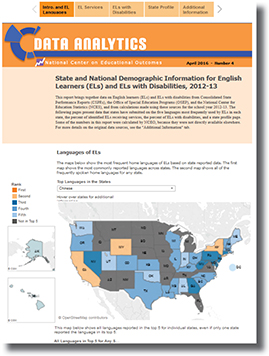 NCEO just published a new Data Analytics, State and National Demographic Information for English Learners (ELs) and ELs with Disabilities, 2012-13. There is wide variation across states in the most common home languages, and the percentage of ELs and ELs with disabilities.
NCEO just published a new Data Analytics, State and National Demographic Information for English Learners (ELs) and ELs with Disabilities, 2012-13. There is wide variation across states in the most common home languages, and the percentage of ELs and ELs with disabilities. The 2016 National Conference on Student Assessment (NCSA) is the premiere forum for assessment practitioners to discuss what is happening in the real world of educational assessment—what is new, what is going on at the state and federal level, what works, and what does not. This year, the NCSA meeting will be held in Philadelphia, PA, on June 20-22, and NCEO staff members will participate in several sessions.
The 2016 National Conference on Student Assessment (NCSA) is the premiere forum for assessment practitioners to discuss what is happening in the real world of educational assessment—what is new, what is going on at the state and federal level, what works, and what does not. This year, the NCSA meeting will be held in Philadelphia, PA, on June 20-22, and NCEO staff members will participate in several sessions.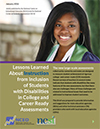 Recent surveys of teachers found that students with disabilities like many of the features of the new college- and career- ready (CCR) assessments that were recently rolled out by states and consortia, but that there are challenges related to instructional issues that need to be addressed to improve student outcomes. To address this issue NCEO and the National Center on Systemic Improvement recently co-published a Brief on Lessons Learned About Instruction from Inclusion of Students with Disabilities in College and Career Ready Assessments.
Recent surveys of teachers found that students with disabilities like many of the features of the new college- and career- ready (CCR) assessments that were recently rolled out by states and consortia, but that there are challenges related to instructional issues that need to be addressed to improve student outcomes. To address this issue NCEO and the National Center on Systemic Improvement recently co-published a Brief on Lessons Learned About Instruction from Inclusion of Students with Disabilities in College and Career Ready Assessments.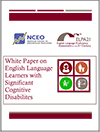 NCEO developed a white paper to address approaches that states might take for an alternate assessment of English Language Proficiency (ELP) for students with significant cognitive disabilities. The development of this paper was accomplished through the work of NCEO staff with the English Language Proficiency Assessment for the 21st Century (ELPA21) consortium, which is developing an assessment of ELP.
NCEO developed a white paper to address approaches that states might take for an alternate assessment of English Language Proficiency (ELP) for students with significant cognitive disabilities. The development of this paper was accomplished through the work of NCEO staff with the English Language Proficiency Assessment for the 21st Century (ELPA21) consortium, which is developing an assessment of ELP. If you plan to attend this year’s Council for Exceptional Children (CEC) annual convention (April 13-16) held in St. Louis or the American Educational Research Association (AERA) annual meeting (April 8-12) held in Philadelphia, we invite you to attend conference sessions delivered by NCEO staff members.
If you plan to attend this year’s Council for Exceptional Children (CEC) annual convention (April 13-16) held in St. Louis or the American Educational Research Association (AERA) annual meeting (April 8-12) held in Philadelphia, we invite you to attend conference sessions delivered by NCEO staff members.